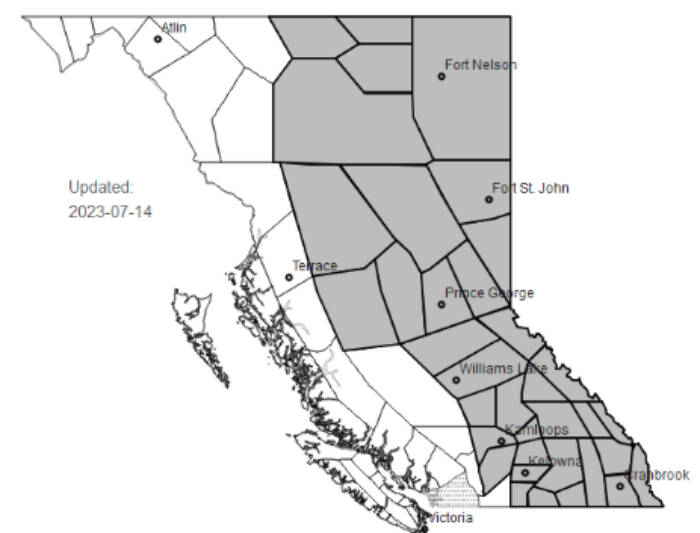Smoke from wildfires is affecting air quality throughout much of B.C.
The Ministry of Environment issued a smoky skies bulletin Friday, July 14, for a large eastern portion of the province. The affected regions are likely to be impacted by wildfire smoke over the next 24 to 48 hours.
The smoke is causing poor air quality and reduced visibility, Environment Canada says.
Environment Canada air quality meteorologist Amir Nazem says the smoke is coming from multiple sources, but primarily from wildfires burning in central B.C. in the Prince George area and from the northeast of the province.
Nazem says the smoke is blowing southeast at the moment and is expected to stick around for the next day or two.
He says the hope is that the smoke dissapates by the end of the weekend or early next week, as a low pressure system is building off the coast and making its way to the shore.
“That will bring in a cold front and more winds will blow, and that will get rid of the smoke,” he said.
During a wildfire, smoke conditions can change quickly over short distances and can vary considerably hour by hour.
People with pre-existing health conditions, respiratory infections such as COVID-19, older adults, pregnant women and infants, children and sensitive individuals are more likely to experience health effects from smoke exposure.
B.C.’s air quality index shows most of the province currently has a low air quality risk. The Fort St. John and Prince George air quality ratings are moderate, the Quesnel area has a high air quality risk, Kamloops has a high air quality risk moving to moderate tonight and low tomorrow, and Williams Lake has a moderate rating switching to high tonight and tomorrow.
Here are some tips to reduce your smoke exposure:
• Smoke levels may be lower indoors but will still be elevated, so stay aware of your symptoms even when you are indoors.
• Running a commercially available HEPA (high efficiency particulate air) filter can improve indoor air quality in the room where the device is located.
• If you have a forced air heating/cooling system in your home, it may help to change the filter and set the fan to run continuously.
• Reduce indoor air pollution sources such as smoking, burning incense, and frying foods.
• If travelling in a car with air conditioning, keep the windows up and the ventilation set to recirculate.
• If you are very sensitive to smoke, consider moving to another location with cleaner air, but be aware that conditions can change rapidly.
• Maintaining good overall health is a good way to prevent health effects resulting from short-term exposure to air pollution.
People with lung disease (such as asthma) or heart disease and people who work outdoors are at higher risk of experiencing health effects caused by wildfire smoke. Speak with your health care provider about developing a management plan for wildfire smoke events and maintaining a supply of necessary medications at home and always carrying these medications with you during wildfire season.
Check firesmoke.ca for hour-by-hour smoke forecasts.
READ MORE: Heat forecast sparks Vernon fire chief to offer wildfire prevention tips
READ MORE: Smoke spotted near Penticton’s Skaha Hills as crews attack grass fire

